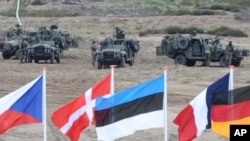As Poland's President Andrzej Duda is sworn in to office Thursday, a growing chorus of voices in eastern Europe is supporting his view to have permanent troops from NATO to warn off threats from Russia.
“It’s still the case that the farther east you go in Europe the greater the threat perception from Russia and the more direct the problem seems to be, the more immediate their concerns are,” said Keir Giles, director of London's Conflict Studies Research Center and an expert in the Russia Eurasia Program at Chatham House. He spoke to VOA via Skype.
Poland shares a border with Russia's Kaliningrad, a heavily militarized area that is cut off from mainland Russia by Lithuania and the Baltic Sea. Moscow would likely view a permanent NATO presence in Poland as an act of aggression.
The Kremlin last year seized Ukraine's Crimean peninsula but denies giving military support to rebels in eastern Ukraine despite mounting evidence.
Giles said Russia's actions in Ukraine raised concern among more Europeans about Russian intentions for former Soviet states.
“So, this is not a new issue. It is one that Poland in particular and the Baltic states have been mentioning for some considerable time. It’s just that before the Ukraine crisis they were viewed within NATO, and to some extent within the EU, as troublemakers who were making a fuss about Russia when really there was not a problem there. Now, of course, they have proved entirely correct," he said.
Since 2014, Russian warplanes have violated neighboring airspace at a rate not seen since the Cold War, with NATO jets scrambling hundreds of times to intercept and escort them away.
Giles argues the Kremlin is looking to correct the loss of its global influence by projecting power beyond its borders.
“I think one of the main points of looking for an increased NATO presence in these front-line states is to deny Russia easy opportunities. Because it has been stated repeatedly within Russia that some of the Baltic states, the former Soviet territories in particular, are former Russian territories. That’s been something that’s been said directly by President Putin. And, Russia has demonstrated twice now in the past seven years that it is quite content to use military force against its neighbors in order to re-draw borders,” Giles said.
Russia's 2008 invasion of Georgia sent shock waves throughout former Soviet states along Russia's border. Baltic nations worry the Kremlin could allege repression of their ethnic Russian populations as an excuse for taking territory, as it did in Ukraine.
Unlike NATO's announced exercises, Russia has held several large-scale, snap military drills seen as messages to its western neighbors as well as Ukraine.
NATO response
In June NATO announced the U.S. would reinforce alliance members who felt threatened by Russia, including Poland and the Baltics, with hundreds of tanks and thousands of troops. It is the largest deployment to eastern Europe since the Soviet era.
NATO also doubled the size of its Baltic air policing and established a rapid-reaction force to deal quickly with any sudden invasion.
“There are no hidden intentions and there is nothing sort of intrinsically anti-Russian,” said Robert Pszczel, who headed the NATO Information Office in Moscow starting in 2010 and is now based in Brussels while his successor is chosen. “But, at the same time.. NATO nations have to respond to the real security challenges which Russia's actions have become,” he added.
Since the Ukraine crisis, Russian state media have been painting NATO as encircling Russia. It claims NATO broke a promise not to expand east, though no such agreement was ever signed, while enticing former Soviet nations to become members.
The Kremlin wants Ukraine to declare itself a neutral state that will never join NATO and many analysts suspect its military support for pro-Russia rebels is to ensure that goal.
Pszczel says Moscow's attitude to Ukraine illustrates it still has problems respecting the rights of former Soviet states.
“We do not question the right of various countries to be...part of the Collective Security Treaty Organization and Shanghai Group and others,” he said. “And, in the same way we do not expect any country, including Russia, to question the right of the countries to choose their own path.”
Pszczel said while NATO-Russia relations had ups and downs during his time in Moscow, they were mainly cooperative. “I think it's fair to say that we have been moving forward until, essentially, the Ukrainian crisis. We had cooperation on Afghanistan, fighting terrorism, fighting piracy, civil emergency. The list is quite long,” he said.
Original purpose
Some analysts argue the tensions with Russia are bringing NATO back to its original purpose of checking Moscow-led aggression in Europe.
Pszczel said NATO is ready to cooperate with Russia on numerous issues but the ball is in Moscow's court.
Giles agrees. “As long as Russia believes its own propaganda, in particular Russian decision-makers and policy makers are forced to follow the official line on NATO being a threat, then it makes it impossible for NATO to make any kind of concession or friendly gesture which will actually alleviate the situation. The trajectory of Russian thinking at the moment and the trajectory of Russian preparations for mobilizing society and preparing for a major conflict is really not encouraging,” he said.
NATO's largest military exercises in more than a decade begin in October, involving an estimated 36,000 troops from 30 countries.
Like all scheduled NATO drills, Russia has been invited to attend the land and sea-based exercises that will take place around Italy, Portugal, and Spain.




